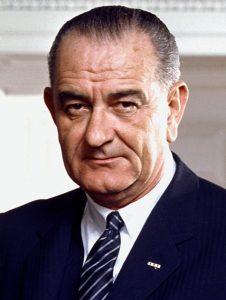
LBJ
In 1948, Johnson was running for a US Senate seat and was deadlocked against the favourite, when he developed an obstructing kidney stone in the upper third of his ureter. He thought he would require a ureterolithotomy; but did not want to have one, since that might require him to drop out of the race.
Dr Neil Baum (Professor of Urology at Tulane Medical School), in 2022, explained that Johnson met with Dr. Gershom Thompson at the Mayo Clinic for a second opinion, and Thompson agreed to try an endoscopic stone removal, even though he had never before removed a stone in the upper third of the ureter. Thompson was successful, and Johnson had a prompt recovery, allowing him to return to the campaign and win.
Baum notes that Johnson’s recovery raises several ‘what if’ questions, such as “how might the world have changed if LBJ had not had a successful endoscopic retrieval of a proximal ureteral stone and been unable to win his Senate race?”
Dr Baum considers Johnson’s legacy as President of the United States, from passing the Civil Rights Act to accelerating US military involvement in Vietnam. Conversely, he also asks, “what if we did not have the two government healthcare programs, Medicare and Medicaid, that were instituted and approved during the Johnson Administration?”
Last Reviewed on 5 September 2023
